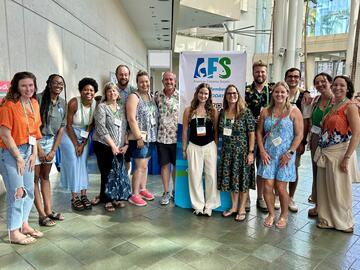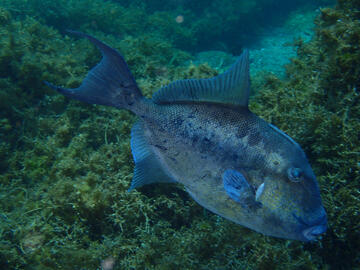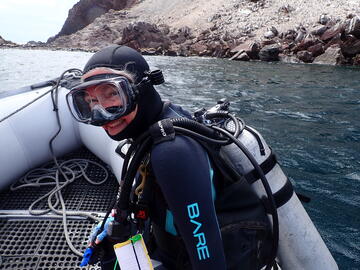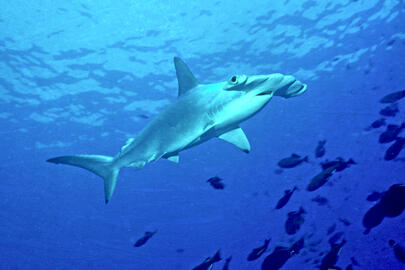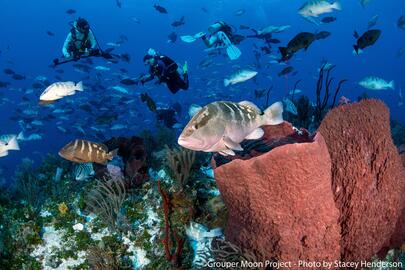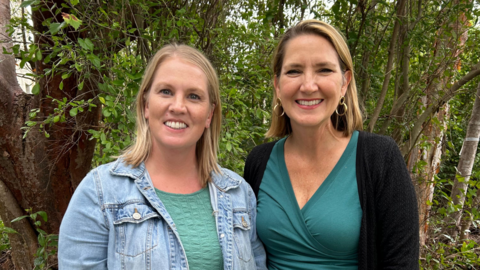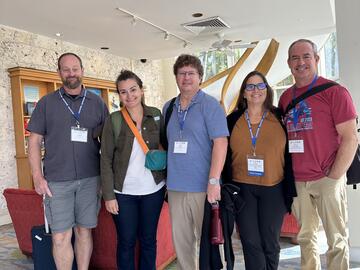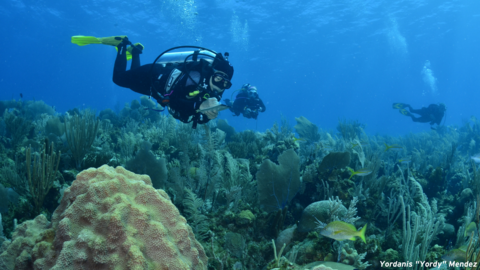REEF staff and collaborators attended the 154th annual American Fisheries Society (AFS) Conference last month, held in Honolulu, Hawaii. REEF's marine life database is a valuable tool for conservation science and research on a global scale, and we were proud to represent our work at this notable conference. Nine sessions at AFS featured REEF data and/or programs.
Did you know that REEF is part of an international effort to determine how to best use large fish biodiversity datasets? REEF Co-Executive Director of Science & Engagement Dr. Christy Semmens is part of a working group called "CoNCENSUS: Advancing standardisation of COastal and Nearshore demersal fish visual CENSUS techniques", led by Anthony Bernard from the South African Institute for Aquatic Biodiversity and Rick Stuart-Smith from Reef Life Survey. Christy will attend the upcoming CoNCENSUS working group meeting in South Africa this October.
Tropical regions are, in general, more diverse than ecosystems at higher temperate latitudes. A commonly held hypothesis is that the diverse predators in tropical regions cause predation to have a relatively stronger role in shaping communities. Data from the REEF Volunteer Fish Survey Project (VFSP) were used by Michele Repetto and colleagues from the Smithsonian Tropical Research Institute to test for underlying differences in regional fish diversity that could contribute to variation in predation intensity and impact.
REEF and the Semmens Lab at Scripps Institution of Oceanography (SIO) are collaborating on an exciting new project that uses cutting-edge technology to improve our understanding of ocean ecosystems. The idea is simple: enable REEF volunteers to collect bits of environmental DNA (eDNA), the genetic material that animals shed into their surroundings. REEF surveyors, who are already in the water conducting fish surveys as part of the Volunteer Fish Survey Project (VFSP), are excellent candidates to help gather eDNA samples.
Our partners at the Cayman Islands Department of Environment (DoE) recently used REEF data to evaluate Scalloped Hammerhead shark populations in the Cayman Islands, and their findings could mean good news for the future of hammerhead sharks in the area! The Scalloped Hammerhead is a critically endangered shark species with a decreasing global population. They are normally seen in large schools in the Pacific Ocean, but this is a rare sighting in the Atlantic Ocean, and schools of Scalloped Hammerheads have not been observed in the Cayman Islands for decades.
REEF recently concluded the annual field season for the Grouper Moon Project, a highly successful conservation science collaboration between REEF and the Cayman Islands Department of Environment (DOE) to study one of the largest and last known spawning aggregations of endangered Nassau Grouper in the Caribbean. The research team, made up of REEF staff and volunteers, along with our collaborators from DOE, Scripps Institution of Oceanography, and Oregon State University, conducted daily dives on the aggregation off the west end of Little Cayman, and visited the an active aggregation on Caym
Last month, we wrapped up the year-long celebration of the 30th anniversary of the Volunteer Fish Survey Project (VFSP). Since its launch in 1993, this citizen science program has generated one of the largest marine life databases in the world. Here are a few stats to recap a great year!
We are very excited to welcome two new staff to the REEF Team - Jill Kuehnert (right) as Campus Director and Dr. Kindra Bartz (left) as Operations Manager. Both are based at the REEF Campus in Key Largo, Florida.
Last month, a team of scientists represented REEF at the 76th annual Gulf and Caribbean Fisheries Institute (GCFI) conference, held in The Bahamas. REEF programs and data were represented by REEF Co-Executive Director, Dr. Christy Pattengill-Semmens, and Conservation Science Associate, Lex Bryant, as well as our partners from Scripps Institute of Oceanography (Dr. Brice Semmens) and Oregon State University (Dr. Scott Heppell).
2023 marks the 30th anniversary of the REEF Volunteer Fish Survey Project. Since its launch in 1993, this citizen science program has generated one of the largest marine life databases in the world through marine life sightings surveys conducted by volunteer divers and snorkelers. A key aspect of the project's success and impact is that REEF data are available to everyone.

